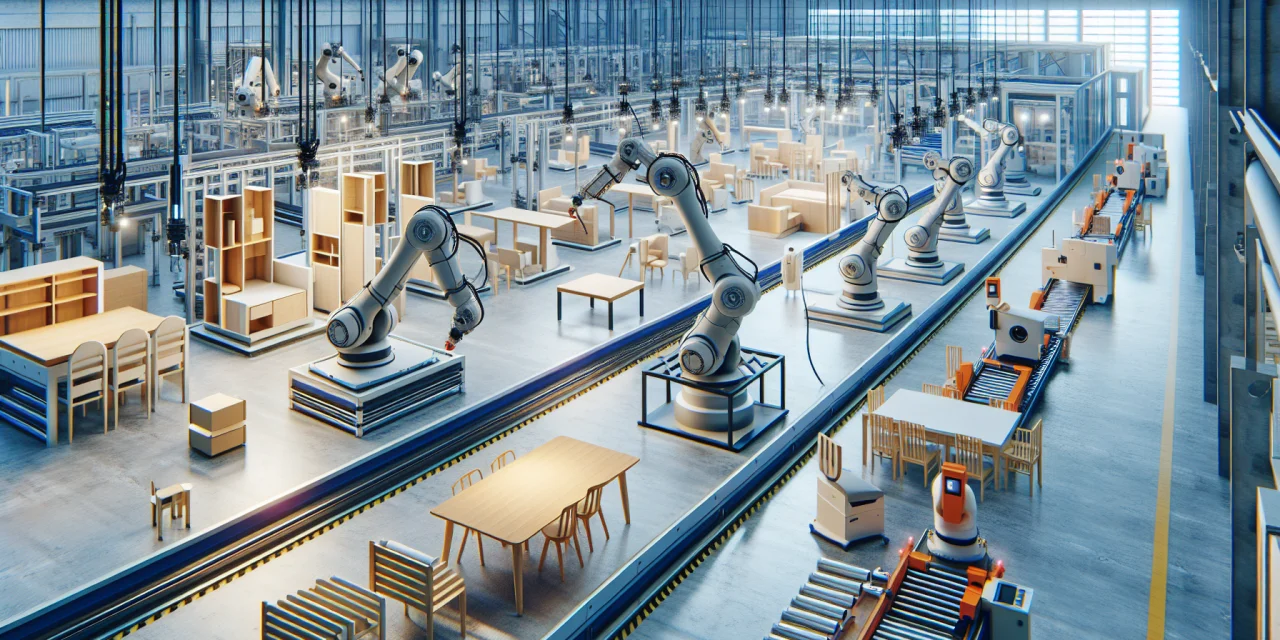Why AI & Automation Are Game-Changers in Furniture Manufacturing
The furniture industry is embracing Industry 4.0: AI-driven robots, predictive analytics, and modular automation are no longer futuristic—they’re reshaping how furniture is designed and produced. Investment in AI for manufacturing is forecast to jump from $1.1B in 2020 to $16.7B by 2026, with a 57% growth—highlighting the transformative impact of intelligent automation.
1. Robotic Assembly via Generative AI & Speech-Enabled Design
Researchers are developing systems that translate voice prompts into 3D furniture models, which robotic arms then assemble from modular voxels—transforming what previously took days into seamless, five-minute pick-up builds . Imagine ordering a custom chair from home and seeing it assembled on-site—this fusion of AI and robotics signals the dawn of on-demand manufacturing.
2. Magnetic-Levitation (Maglev) Conveyors for Speed and Precision
A cutting-edge AI-controlled maglev conveyor demonstrated at a recent industrial expo combines frictionless motion with adaptive routing—speeding up assembly of delicate parts without needing complex robotic arms, and optimizing energy use and maintenance. The result: faster production with lower operational costs.
3. Reconfigurable Robot Workcells for SMEs
Modular robotic cells that reconfigure quickly are empowering small-to-medium furniture producers. These systems allow manufacturers to adapt from batch to batch seamlessly, drastically reducing setup times and enabling flexible production without huge investments.
4. AI-Powered Vision and Grasping Systems
Advanced AI-driven vision systems integrated with robots—using deep learning—can identify, grasp, and manipulate diverse furniture components with a 95% success rate and up to 350 picks per hour. These technologies, honed at fairs like Hannover Messe, increase throughput and precision.
5. Predictive Maintenance & Smart Factory Integration
Smart factory platforms tie together AI, IoT, and robotics to monitor machine health, forecast failures, and optimize production workflows. This integration boosts uptime and efficiency while lowering waste—hallmarks of Industry 4.0 in action.
6. Synthetic Data for Smarter Robotics Training
To overcome real-world data limitations, some exhibitors at automation expos (e.g., Automate 2025) are using 3D photorealistic simulations to generate synthetic training data—enhancing robot perception and reducing bias in assembly tasks.
What This Means for Global Furniture Manufacturers
Customization at Scale: Voice-driven design and modular assembly allow bespoke products without the typical lead time or cost.
Efficiency & Sustainability: Maglev conveyors and predictive maintenance cut down on energy use, parts waste, and labor overhead.
Flexibility: Reconfigurable robot cells enable agile manufacturing—adapting swiftly to design trends and small-batch demands.
Quality & Reliability: AI vision systems ensure consistent precision, even with varied parts and materials.
What to Watch as We Approach 2026
| Innovation | Impact |
|---|---|
| Speech‑to‑Assembly AI | Rapid, personalized production |
| Maglev Automation | Energy-efficient, precise part handling |
| Reconfigurable Cells | SME access to advanced automation |
| AI Grasping Robots | High‑volume, low-error assembly |
| Smart Factories | Integrated, data-driven production workflows |
| Synthetic Training Data | Smarter, bias-minimized robotic AI |
By 2026, leading furniture fairs and manufacturing expos will spotlight not only product design—but the intelligence behind its making. Turkish manufacturers that invest in AI-driven assembly, modular workcells, and smart conveyors can leapfrog into a future of bespoke craftsmanship, agile production, and global competitiveness.








